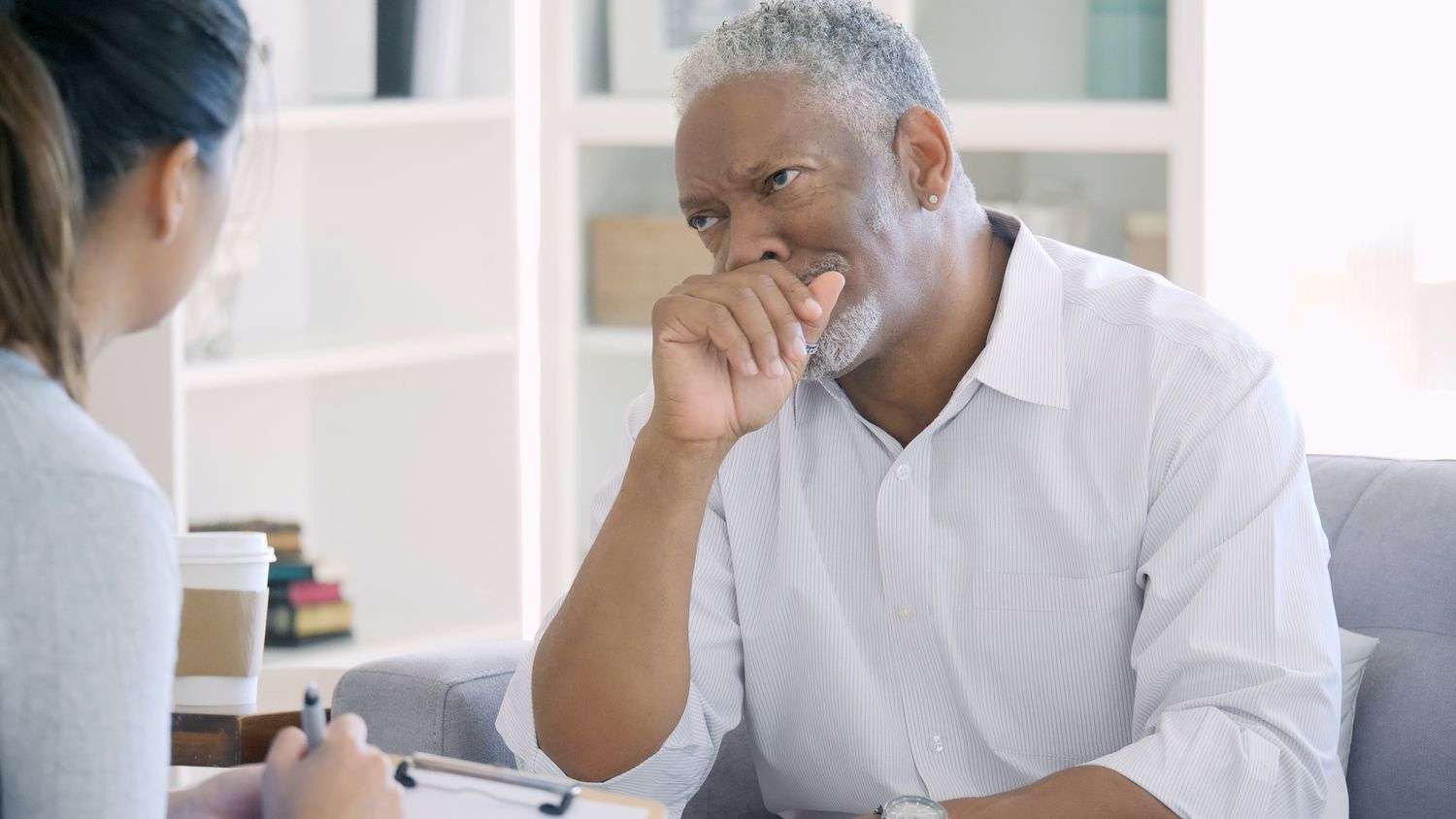Have you considered clinical trials for Anxiety?
We make it easy for you to participate in a clinical trial for Anxiety, and get access to the latest treatments not yet widely available – and be a part of finding a cure.
Check your eligibility
When does anxiety become an anxiety disorder?
Approximately 31.1% of American adults will develop an anxiety disorder at some time in their lives¹.
The medical definition of an anxiety disorder is when worrying stops you from functioning normally, is out of proportion to the circumstances, and you experience it most days, for six months or longer¹.
Anxiety disorders are generally associated with having constant and excessive fear or worry in everyday life, with an urge to avoid situations connected to this fear.
Unlike the occasional bout of anxiousness, chronic anxiety doesn’t come and go on its own—the stress response is constantly activated.
There are several types of anxiety disorders. These include:
-
Generalized anxiety disorder:Constant and excessive worry or stress that interferes with everyday activities
-
Panic disorder:Recurring, sudden panic attacks, accompanied by physical and psychological distress
-
Social anxiety disorder:Overwhelming worry and discomfort in social situations, with a fear of embarrassment, rejection, humiliation, or being looked down upon
-
Phobias:Intense and persistent fear of a certain thing(s) or situation(s), out of proportion to the actual threat
-
Separation anxiety disorder:Extreme fear of separation from a person or fear that something terrible will happen to a loved one
Symptoms
Anxiety can make you feel tense or worried, and you may notice that it heightens your alertness.
For example, when you’re anxious, you might feel sweaty, your heart might race, and your breathing becomes faster than usual, or you suddenly realize that you’ve been holding your breath.
How long does an anxiety disorder last?
There is no set timeframe for how long an anxiety disorder is expected to last, it is highly individual. However, there are some known factors you should be aware of.
According to one three-year study² factors for anxiety disorder duration include:
-
Being in an older age group
-
Lacking a paid job
-
Living alone
-
Having a physical disorder or poor physical functioning
-
How quickly you’re diagnosed and treated
-
The type of anxiety disorder (social anxiety disorder tends to have a longer duration and slower response to treatment)
-
Having multiple anxiety disorders
Timely diagnosis is important
One of the guidelines for diagnosing generalized anxiety disorder is having severe, persistent anxiety and symptoms for at least six months.
From the time of diagnosis, an anxiety disorder can last from a few months to many years.
Most people will have symptoms of an anxiety disorder for a long time before seeking professional help, sometimes up to 15 years³.
What does research indicate?
Without any intervention, anxiety disorders can worsen over time and prolong the impact on your everyday life.
Anxiety can lead to other psychological and physical problems, such as depression, insomnia, social isolation, substance abuse, and gastrointestinal problems.
The evidence indicating how long anxiety disorders tend to last shows mixed results. Anxiety disorders can be long-lasting, but full recovery is also possible.
Data from the Netherlands Mental Health Survey and Incidence Study-2⁴ indicates
-
The median duration of an anxiety disorder is around 7.5 months⁴
-
Some studies⁵ report that generalized anxiety disorder follows a pattern of recovery and relapse for up to 20 years.
The risk of relapse
Even after recovering from an anxiety disorder, you will still experience anxiousness. However, instead of the persistent symptoms of a disorder, you will feel occasional anxiety that switches “on” and “off” in response to stress.
Some people experience a relapse even after they appear to have recovered from anxiety. Statistically, this seems most likely to happen after the 3-year⁵ point of treatment and recovery.
Why does an anxiety disorder come back?
In response to stopping anxiety medication
It can be tempting to stop medicating your anxiety once you start to feel better. However, it’s vital to speak to your doctor before making any changes. Medications usually take time to work, but once they start, they continue to have a beneficial effect over time.
A third⁶ of people who suddenly stop taking antidepressants midway through treatment relapse.
Suddenly stopping medication can also cause withdrawal symptoms that closely mimic anxiety.
Other possible factors include:
-
Stressful life events
-
Other mental health conditions
-
Having anxiety-like symptoms that don’t quite meet the diagnostic criteria for having a disorder
How to live with anxiety and recover
Finding constructive ways to cope with your anxiety disorder can empower you to return to your usual activities and feel positive about your well-being and relationships.
Targeting both the physical and psychological aspects of anxiety disorders through treatment will help you better manage your anxiety.
Here are some evidence-based ways to help you live with and recover from anxiety:
See a healthcare professional
A healthcare professional can help you undergo a mental health assessment and offer various treatment options or medications. This can be your main doctor or a psychiatrist.
The sooner you explore treatment options, the better your outcome is likely to be.
How to Find the Right Doctor to Help With Your Anxiety
Exercise and make other lifestyle changes
Making lifestyle changes such as regular exercise, prioritizing sleep, stepping away from social media, eating a balanced and nutritious diet, reducing or eliminating alcohol and caffeine intake, quitting smoking, and maintaining a good support network can all help manage your anxiety.
Stick to your recommended treatment plan
This may involve taking medications as prescribed, going to appointments, or following up on homework between therapy sessions.
If you have any concerns about your treatment or experience any side effects, it’s important to discuss this with your doctor before making any changes.
Psychotherapy (talk therapy)
Psychotherapy helps to manage both the physical and psychological aspects of anxiety disorders.
A well-known and effective type of psychotherapy is cognitive behavioral therapy (CBT). CBT helps you understand the connections between your thoughts, feelings, and behavior.
It teaches you to identify unhelpful thought patterns and learn coping mechanisms for anxiety-provoking situations.
Over time, as you improve, the focus will shift to learning how to recognize and manage relapses.
CBT is not an instant fix and requires a commitment to regular sessions with tasks in between sessions. 12–16 weekly sessions are usually sufficient, but your therapist should discuss the recommended duration of treatment based on your needs.
Often, improvements are seen somewhere between 4–6 weeks⁷.
Relaxation techniques
Relaxation and breathing exercises and mindfulness meditation can help to reduce the physical symptoms of anxiety and make them feel less overwhelming. These techniques also bring your attention to the present moment and help you to ruminate less on the past and future.
A Guide To Meditating For Anxiety
Medications
Antidepressants, including selective serotonin reuptake inhibitors (SSRIs) and serotonin-norepinephrine reuptake inhibitors (SNRIs), are evidence-based effective medications for anxiety. However, they are slow-acting and can take 4–6 weeks to have a noticeable effect. One study³ shows that the recovery rates in participants taking paroxetine (an SSRI) reached 73% after 32 weeks of taking the medication, compared to 11% remission in the placebo group.
Beta-blockers can help manage and reduce physical symptoms of anxiety, short-term or as-needed to reduce acute anxiety. Benzodiazepines are sometimes used for the short-term management of anxiety symptoms. They work quickly and can bring relief within 30 minutes.
However, you can develop a tolerance and dependence on benzodiazepines when taken regularly. They become less effective over time and you may get withdrawal effects and increased anxiety when you stop taking them. Because of this, benzodiazepines are not the first line of treatment for anxiety disorders.
Notes on treatment
-
Research⁷ shows that a combination of psychotherapy and medication is a more effective long-term option, compared to just one or the other.
-
Anxiety disorders tend to be chronic or aggravated by periods of stress. To help you manage and prepare for difficult times, stay in close communication with your doctor or therapist.
The lowdown
Mental health conditions are highly individual, and so it is impossible to predict exactly how long your anxiety disorder will last. There is evidence to suggest that the median, or “middle” length of time for an anxiety disorder to last is 7.5 months, but that is one study’s findings. More research is definitely warranted.
Just remember, if you have anxiety that limits your ability to function in everyday life, many different treatment options are available. Some people can experience a full recovery, while others will improve their symptoms and significantly regain their quality of life.
Anxiety is the body’s natural response to stress, perceived threats, and fear. Anxiety usually goes away once the threat or stressor passes and your system calms down.
However, if you have an anxiety disorder, anxiety can linger beyond the triggering event and become out of proportion. Chronic (long-term) or severe anxiety can seriously impair your daily functioning.
While you can’t banish anxiety altogether, anxiety and anxiety disorders can be treated and managed.
We’ll go over what distinguishes anxiety disorders from standard anxiety, risk factors, treatment options, and more.
Does anxiety ever really go away?
A person’s tendency toward anxiety is determined by several factors, including their genetic makeup, life experiences, environment, and more.
Since it’s a natural part of the human condition, anxiety is not completely curable. But feeling anxious should be a temporary state that resolves when a stressor or trigger has passed.
Anxiety is bound to make an appearance sometimes, such as when you’re giving a big presentation at work or when you have an acute health issue.
Anxiety disorders, on the other hand, are different from average feelings of anxiety. Anxiety disorders are marked by excessive, prolonged worrying. You might feel overwhelmed easily and be unable to stop feeling anxious.
If left untreated, anxiety disorders can worsen over time and negatively impact your quality of life.
This might look like:
- avoiding personal or professional obligations
- isolating yourself or not wanting to go out
- becoming depressed
- lower self-esteem
- having panic attacks
It’s important to recognize when anxiety has too much control over you and to seek help. There are ways to manage anxiety and keep it from running your life.
What is anxiety?
Anxiety is an emotional state that involves feelings of worry, apprehension, and stress. As the American Psychiatric Association explains, anxiety usually involves being concerned about something happening in the future. This could be a specific event or an abstract fear.
When you’re anxious, you can also have temporary physical symptoms, such as an increased heart rate and sweating.
Anxiety is also a state of high alert when there’s a perceived threat or possibility of a threat. It serves an evolutionary purpose to keep us alert to danger and looking out for our self-preservation.
Why does anxiety return?
Even if you’ve learned how to manage anxiety, it’s a safe bet that you’ll experience some level of anxiety again in your lifetime.
Anxiety may crop up in response to events such as:
- financial issues
- work stress, including in a new job
- trouble with interpersonal relationships
- fear of being alone
- dealing with serious health issues
- loss of a loved one
- major life changes, such as marriage or a move
Your anxiety level is likely to fluctuate throughout your life, depending on what’s happening or what’s on your mind.
Remember — anxiety is not inherently bad. It can help us be prepared for whatever comes our way. But when you’re feeling anxious all the time and feel unable to calm down, this is a cause for concern.
Chronic anxiety that is out of proportion to the stressor or situation may signify an anxiety disorder.
Natural remedies
Though the following natural remedies have been linked to diminished anxiety in some studies, more research is needed to prove a definitive helpful connection. However, many home remedies for anxiety and mood disorders have long been popular and have a lot of anecdotal support.
It’s important to consult a doctor before starting any of the following natural remedies, especially if you have preexisting health conditions or are on medication. Natural remedies for anxiety include:
- CBD (comes in various forms)
- chamomile (including tea and oil)
- magnesium
- valerian root
- lemon balm
Outlook
Everyone experiences anxiety at one time or another. Anxiety usually goes away once the triggering event is over, but it may reoccur depending on your life circumstances.
An anxiety disorder can become a long-term condition. If left untreated, anxiety disorders can worsen and substantially disrupt your life. Anxiety has been linked to an increased incidence of depression and substance use disorders, among other health complications.
While you may not be able to banish anxiety forever from your life, anxiety disorders can be treated and managed with traditional and alternative therapies.
These include:
- behavioral therapies
- talk therapy
- medication
- lifestyle changes
Not all treatment options will work for everyone, and you may have to explore a few to find one that’s right for you.
You don’t have to deal with anxiety alone. If your anxiety feels overwhelming or unmanageable, reach out to a healthcare or mental health professional for help. You don’t have to handle anxiety on your own, and you deserve care and support.



